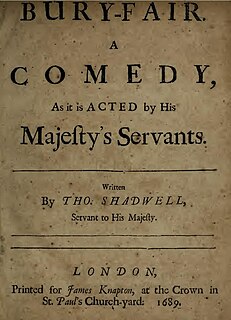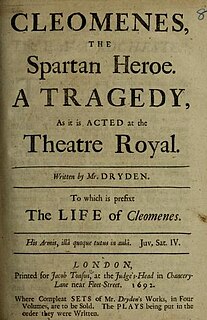Related Research Articles
The Royalist is a 1682 comedy play by the English writer Thomas D'Urfey. It was staged at the Dorset Garden Theatre by the Duke's Company, shortly before the merger that created the United Company. It is set during the Commonwealth Era following the English Civil War.

The Old Bachelor is the first play written by British playwright William Congreve, produced in 1693. Henry Purcell set it to music. Originally staged by the United Company at the Theatre Royal, Drury Lane the cast included Thomas Betterton as Heartwell, George Powell as Bellmour, Joseph Williams as Vainlove, William Bowen as Sir Joseph, Joseph Haines as Bluff, Thomas Doggett as Fondlewife, Cave Underhill as Servant, Anne Bracegirdle as Araminta, Susanna Mountfort as Belinda, Elizabeth Barry as Laetitia, Elizabeth Bowman as Sylvia, Elinor Leigh as Lucy.

Epsom Wells is a 1672 restoration comedy by the English writer Thomas Shadwell. It was the first in a line of plays set in spa towns. The incidental music was composed by Nicholas Staggins. In the 1690s Henry Purcell scored a new staging of the play. It was performed at the Dorset Garden Theatre by the Duke's Company. The cast included Henry Harris as Rains, Thomas Betterton as Bevil, William Smith as Woodly, Cave Underhill as Justice Clodpate, Anne Gibbs as Lucia, Mary Betterton as Mrs Jilt, James Nokes as Bisket and Edward Angel as Fribble.
The Adventures of Five Hours is a 1663 comedy play by the English writer Sir Samuel Tuke, 1st Baronet. Based on the play Los empenos de seis horas by Antonio Coello, It is an early example of the developing Restoration comedy tradition. Its success led to a series of sentimental plays in the Spanish style about love and honour, very different to the more sophisticated and cynical comedies which the Restoration era became known for.
The Slighted Maid is a 1663 comedy play by the English writer Robert Stapylton.
Squire Oldsapp is a 1678 comedy play by the English writer Thomas D'Urfey. Staged by the Duke's Company at the Dorset Garden Theatre in London, the original cast included Thomas Betterton as Welfore, William Smith as Henry, John Crosby as Lovell, James Nokes as Squire Oldsapp, Anthony Leigh as Sir Frederick Banter, Samuel Sandford as Colonel Buff, Cave Underhill as Pimpo, Emily Price as Christina and Elizabeth Currer as Madame Tricklove.
The Counterfeits is a 1678 comedy play by the English writer John Leanerd. It was staged by the Duke's Company at the Dorset Garden Theatre with a cast that included Anthony Leigh as Don Gomez, Thomas Gillow as Don Luis, Thomas Betterton as Vitelli, Henry Harris as Antonio, Matthew Medbourne as Carles, William Smith as Peralta, Thomas Percival as Dormilon, Cave Underhill as Fabio, Joseph Williams as Crispin, John Richards as Tonto, Mary Lee as Elvira, Emily Price as Violante and Anne Shadwell as Flora.

The Counterfeit Bridegroom; Or, The Defeated Widow is a 1677 comedy play. The work's authorship is usually credited to Aphra Behn has been alternatively been attributed to Thomas Betterton. It was inspired by Thomas Middleton's Jacobean play No Wit, No Help Like a Woman's.
The Pretenders; Or, The Town Unmask'd is a 1698 comedy play by the English writer Thomas Dilke. It was first staged by Thomas Betterton's company at the Lincoln's Inn Fields Theatre with a cast that included John Thurmond as Lord Courtipell, Cave Underhill as Sir Wealthy Plainder, Edward Kynaston as Sir Bellamour Blunt, John Bowman as Vainthroat, George Bright as Captain Bownceby, William Bowen as Nickycrack, Elizabeth Bowman as Ophelia, Elinor Leigh as Sweetny, Abigail Lawson as Nibs and Elizabeth Willis as Doll.

The She-Gallants is a 1695 comedy play by the English writer George Granville. It was first staged by Thomas Betterton's Company at the Lincoln's Inn Fields Theatre in London.

The Cutter of Coleman Street is a comedy play by the English writer Abraham Cowley. It premiered at the Lincoln's Inn Fields Theatre on 16 December 1661, performed by the Duke's Company. Cowley had originally written it in 1658 during the English Commonwealth era. The title refers to Coleman Street in the City of London. The Royalist Cowley inserted lines mocking the recent republican government of England, including Thomas Harrison who had been executed for regicide the previous year. Although it was released during the Restoration period, along with The Committee its debt to earlier traditions mean that it not a full Restoration comedy in the style that would flourish after George Etherege's The Comical Revenge in 1664.

The Comical Revenge; Or, Love In A Tub is a 1664 comedy play by the English writer George Etherege. First staged by the Duke's Company, it premiered at the Lincoln's Inn Fields Theatre. It is one of the earliest Restoration Comedies.
The Reformation is a 1673 comedy play by Joseph Arrowsmith. Originally staged by the Duke's Company, it premiered at the Lincoln's Inn Fields Theatre in London. The cast included Samuel Sandford as Camillo, Anthony Leigh as Pacheco, Cave Underhill as Tutor, Henry Harris as Antonio, Philip Cademan as Pedro, John Crosby as Leandro, Matthew Medbourne as Lysander, Mary Betterton as Juliana, Margaret Osborne as Lelia and Mary Lee as AEmilia.
Friendship in Fashion is a 1678 comedy play by the English writer Thomas Otway. It was first staged by the Duke's Company at the Dorset Garden Theatre in London. It was part of the trend of Restoration Comedy that flourished during the era.
The Maid's Last Prayer: Or, Any Rather Than Fail is a 1693 comedy play by the Irish writer Thomas Southerne. It was first staged at the Theatre Royal, Drury Lane by the United Company.

Bury Fair is a 1689 comedy play by the English writer Thomas Shadwell. It is part of the tradition of Restoration Comedy that flourished during the era. It was first staged by the United Company at the Theatre Royal, Drury Lane in London.
The Disappointment; Or, The Mother In Fashion is a 1684 comedy play by the Irish writer Thomas Southerne. It was first performed by the United Company at the Theatre Royal, Drury Lane. The prologue was written by John Dryden.

Madam Fickle; Or, The Witty False One is a 1676 comedy play by the English writer Thomas D'Urfey. It was first staged at the Dorset Garden Theatre by the Duke's Company.

Sir Salomon; Or, The Cautious Coxcomb is a 1670 comedy play by the English writer John Caryll. It has often been staged under the title Sir Solomon Single. It was first performed by the Duke's Company at the Lincoln's Inn Fields Theatre in London. It is part of the tradition of Restoration comedy.

Cleomenes, the Spartan Hero or Cleomenes, The Spartan Heroe: A Tragedy is a 1692 tragedy by the English writer John Dryden. It was first staged at the Theatre Royal, Drury Lane by the United Company. It portrays the reign of Cleomenes, the King of Sparta, inspired by Plutarch's history of the period. Dryden's version is strongly Jacobite in drawing parallels from his overthrow to the recent Glorious Revolution in England. Because of this it was temporarily banned by the authority of Queen Mary.
References
- ↑ Van Lennep p.241